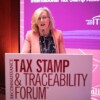
Interview with APO Production Unit
28 Sep 2023 | Interviews, Press Releases
This month, we continue our interview series exploring the experiences of International Tax Stamp Association (ITSA) members, who offer personal perspectives on the tax industry, today’s challenges and opportunities, and tomorrow’s potential progress.

Jaime H Aldaba Jr.
Our eighth interview is with Jaime H Aldaba Jr, Executive Vice President and General Manager of APO Production Unit, Inc (APO), who has more than 25 years’ experience in business development and operations management.
Q: Please would you introduce APO.
A: APO is a Philippines government-owned and controlled corporation registered with the Securities and Exchange Commission, operating under the Presidential Communications Office. It is one of three recognised government printers mandated to undertake printing of accountable forms and sensitive, high-volume documents required by the government.
Q: What makes your company stand out?
A: In 2015, my team was responsible for producing the new Philippine ePassport, a project that gained us international recognition and for which we were awarded Best Regional ID Document in 2016. Since that project, APO has become one of the few companies worldwide that handles all stages of passport production.
Q: What role does your company play in the tax stamp industry?
A: We also produce high security excise tax stamps for the Bureau of Internal Revenue (BIR), and these won Best Design, Best Innovation and Best Tax Stamp Programme at the Tax Stamp Forum in Miami, 2015. As the sole government printer of excise tax stamps, APO also assists the government in the collection of excise taxes via a custom, end-to-end system for the production and monitoring of stamps and the proper collection of related taxes.
We have been printing tobacco stamps since 2013, and are currently working with the BIR to implement end-to-end physical and digital security solutions for liquor and sweetened beverages, all of which supports government efforts to regulate and monitor excise products, ensure tax compliance, and protect public health.
Q: What do you think is the most interesting aspect of tax stamps and/or the industry?
A: The most exciting element of our tax stamp work for me is how it feeds into the welfare and progress of a nation. For us, tax revenue collected with our stamps helps fund projects throughout the Philippine economy. The security features of our stamps also increase consumer confidence in purchasing excisable products, since their authenticity is easy to verify.
Q: What changes have you seen to the tax stamp industry during your time in it?
A: I feel that the most impactful change has been the incorporation of digital security features that make use of downloadable applications on smartphones – specifically the advanced track and trace features that allow hotspots or geo-mapping to detect fakes. These features make it easier for law enforcement to identify counterfeit products with the goal of tracking down the source of their distribution, and the public can feel safer knowing that these technologies are in place for their protection.
Q: What changes do you envisage happening within the industry in future?
A: I would love to see an increase in international collaboration and projects involving them. Governments and organisations from all over the world should seek expert solutions from established printers to implement cost effective tax stamp programmes. Along with growth, we could also benefit from a broader application of excise tax stamps to cover products that are highly counterfeited. This expansion should reflect government recognition of the importance of regulating and monitoring excisable products both for purposes of tax and guarding public health.
As we are in the information age, the industry will inevitably undergo a digital transformation. APO aims to respond by digitising and automating its operations, processes, and systems, plus streamlining the workflow to further increase efficiency. The goal is to consistently deliver high quality tax stamps at a cost-effective price.
Q: What is one change to tax stamps or the industry you would like to see?
A: We would like to see the implementation of a global and enhanced track and trace system using digital solutions. A worldwide tax stamp system could monitor the trade of goods in the global market and ensure each product is equipped with a unique identification code (UIC). The global public would then benefit from the convenience of using a mobile app to authenticate products.
Implementing a worldwide tax stamp system would offer many benefits, not just to the tax stamp industry but to the global economy. It would strengthen the fight against counterfeit operations, as a UIC enables immediate identification of genuine products versus fraudulent ones. It would promote transparency and consumer trust in the global import and export markets and minimise double taxation.
Q: What do you see as the main challenges within the industry today?
A: Ultimately, counterfeiting will always pose the biggest threat to tax stamps. Counterfeit stamps result in lost revenue for governments and undermine effective tax collection efforts. Corollary to this, counterfeit products harm consumer safety and public health. Our greatest challenge lies in implementing robust and dynamic security measures and authentication technologies to prevent counterfeit products.
Another hurdle is the coverage of data and communications networks. Track and trace systems rely heavily on data transmission for real-time monitoring. In areas with inadequate service coverage, or undeveloped communications infrastructure, monitoring can be compromised. Delays in data transmission cause inaccurate tracking, and difficulties in verifying tax stamps using mobile apps.
Q: Why do you think the development of standards is important for the industry?
A: Part of the solution to our many challenges is the development of global industry standards for stamp production. These greatly increase quality and vastly enhance the reliability of tax collection. Such standards ensure that security features make our stamps more resistant to counterfeiting and tampering. In our industry we have to be prepared with alternative solutions and stay one step ahead of counterfeiters.







